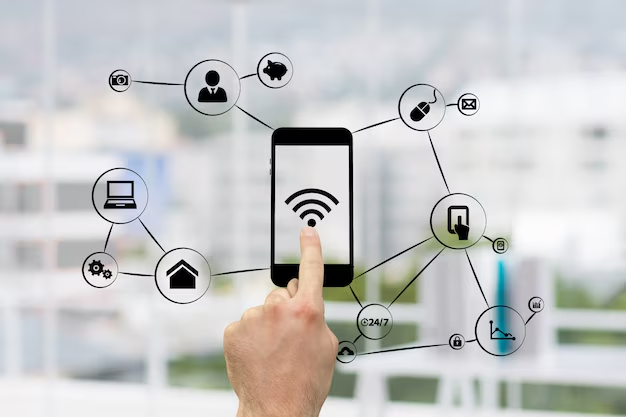5G technology, the fifth generation of wireless communication, is not just a faster internet connection—it’s a game-changer that promises to revolutionize the way industries operate and how people communicate. With speeds up to 100 times faster than 4G, lower latency, and the ability to connect a massive number of devices simultaneously, 5G is set to enable innovations that were once the realm of science fiction. From healthcare to manufacturing, 5G is poised to redefine industries and improve communication on a global scale.
In this article, we will explore how 5G technology is transforming industries and communication, driving efficiency, enabling new technologies, and enhancing the way we live and work.
What is 5G Technology?
5G technology is the latest iteration of mobile networks, designed to provide ultra-fast internet speeds, near-instantaneous response times, and the capacity to handle more devices than ever before. It operates on higher frequency radio waves compared to its predecessor, 4G, and uses advanced technologies such as millimeter waves, small cells, and beamforming to provide a more reliable and expansive connection.
While 4G was designed to handle smartphones and basic data needs, 5G is built for a world of connected devices, offering speeds that will support everything from self-driving cars to virtual reality applications. Its capabilities go far beyond just faster internet browsing.
How 5G is Revolutionizing Industries
- Healthcare: Transforming Patient Care
5G technology is set to make a huge impact on healthcare, enabling advancements in telemedicine, remote surgery, and real-time patient monitoring. The ultra-low latency of 5G allows healthcare professionals to remotely perform surgeries using robotics with minimal delay. This means that specialists can operate on patients anywhere in the world, bridging the gap between healthcare professionals and underserved areas.
Additionally, the ability to connect numerous devices in a hospital setting through 5G will enhance the use of Internet of Medical Things (IoMT) devices that continuously monitor patient health, providing more accurate diagnoses and better care.
- Manufacturing: The Rise of Smart Factories
Manufacturing industries are embracing 5G to create smarter, more efficient factories. With 5G, factory equipment can be connected in real-time, allowing manufacturers to track production and make adjustments instantly. Machine-to-machine (M2M) communication powered by 5G helps reduce downtime and improve automation in assembly lines.
5G enables the use of augmented reality (AR) and virtual reality (VR) tools to assist workers in maintenance, training, and quality control. These tools offer real-time, immersive support, improving overall operational efficiency.
- Automotive Industry: Enabling Autonomous Vehicles
5G is the key enabler of autonomous vehicles. The high-speed, low-latency network ensures that vehicles can communicate with each other and with infrastructure (such as traffic lights and road sensors) in real time. This communication is crucial for making split-second decisions that ensure safety and efficiency.
For example, if a vehicle is about to enter an intersection, it can send and receive information about nearby cars and potential hazards. This level of coordination will help prevent accidents and enable vehicles to navigate autonomously.
- Entertainment and Media: Next-Level Experiences
5G will transform the entertainment industry, especially in areas like live streaming, gaming, and virtual reality. The increased bandwidth and low latency of 5G will allow for seamless streaming of 4K and 8K content, reducing buffering and improving the viewing experience.
For gaming, 5G enables cloud gaming, which allows players to stream games directly from the cloud without the need for high-powered consoles or PCs. Virtual and augmented reality experiences will become more immersive with 5G’s ability to transmit large amounts of data instantly, creating more interactive and engaging environments.
- Agriculture: Revolutionizing Farming Practices
In agriculture, 5G technology is enabling precision farming. Through connected sensors and drones, farmers can monitor soil conditions, track crop health, and make data-driven decisions in real time. This level of connectivity and automation allows for more efficient use of resources, optimizing crop yields and reducing waste.
The ability to deploy autonomous tractors and harvesters that communicate via 5G also promises to reduce labor costs and increase productivity.
How 5G is Changing Communication
- Faster Connectivity for Consumers
One of the most obvious impacts of 5G is the increased speed of mobile internet. Consumers will be able to download and upload content much faster than ever before. This has the potential to enhance the use of mobile apps, video streaming, and social media, allowing users to connect with others more seamlessly.
With 5G, people can experience uninterrupted video calls, access high-definition content, and download large files in seconds, transforming how we communicate both personally and professionally.
- Smart Cities and Internet of Things (IoT)
5G is the backbone of the smart city concept. With its ability to support millions of connected devices, 5G will facilitate the widespread adoption of IoT in urban environments. From traffic lights to public transportation systems and waste management, everything in a smart city will be connected.
This improved connectivity will allow cities to operate more efficiently, reduce traffic congestion, improve public safety, and enhance quality of life for residents.
- Enhanced Business Communication and Collaboration
For businesses, 5G will enable more effective communication and collaboration. Remote teams can take advantage of high-quality video conferencing with minimal latency, while cloud-based productivity tools can be accessed more seamlessly. With enhanced mobile broadband, businesses can share large files instantly and collaborate in real-time, regardless of location.
FAQs on 5G Technology
- What is the main benefit of 5G technology?
- The main benefit of 5G is its faster speeds, lower latency, and greater capacity to support a higher number of connected devices, making it ideal for emerging technologies like autonomous vehicles, smart cities, and IoT.
- How fast is 5G compared to 4G?
- 5G can be up to 100 times faster than 4G, with download speeds reaching up to 10 Gbps, compared to 4G’s 100 Mbps.
- Is 5G available worldwide?
- 5G is gradually being rolled out across the globe, but coverage is still limited in some areas. Many countries are investing heavily in 5G infrastructure.
- Can 5G support autonomous vehicles?
- Yes, 5G’s low latency and fast speeds are essential for enabling real-time communication between vehicles and infrastructure, which is crucial for autonomous driving.
- What industries will benefit most from 5G?
- Healthcare, manufacturing, automotive, agriculture, and entertainment are just a few of the industries that will see significant benefits from 5G technology.
- Is 5G secure?
- While 5G promises to be more secure than previous networks, it also presents new cybersecurity challenges. Ongoing efforts are being made to ensure 5G networks are safe from threats.
- How will 5G impact everyday life?
- 5G will enable faster internet speeds, smarter cities, better healthcare, enhanced entertainment, and more efficient industries, improving convenience and quality of life.
Conclusion
5G technology is set to transform how we communicate and interact with the world around us. From enabling autonomous vehicles and revolutionizing healthcare to boosting entertainment experiences and creating smarter cities, the potential of 5G is vast. While its full impact is still unfolding, the benefits are already apparent in industries ranging from manufacturing to agriculture. As 5G becomes more widespread, we can expect even greater advancements in how we live, work, and connect with one another.
Key Takeaways
- 5G provides ultra-fast speeds, low latency, and high capacity, making it a critical enabler of emerging technologies.
- Industries like healthcare, manufacturing, automotive, and agriculture will experience significant transformations thanks to 5G.
- For consumers, 5G will enhance mobile internet speeds, support smart devices, and improve communication.
- The implementation of 5G will help create smarter cities, revolutionize business collaboration, and bring about new opportunities in entertainment and gaming.

